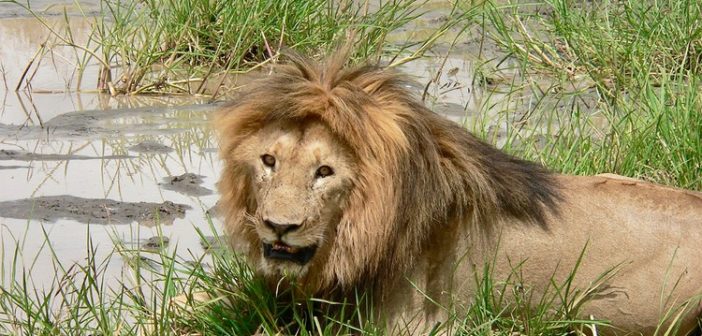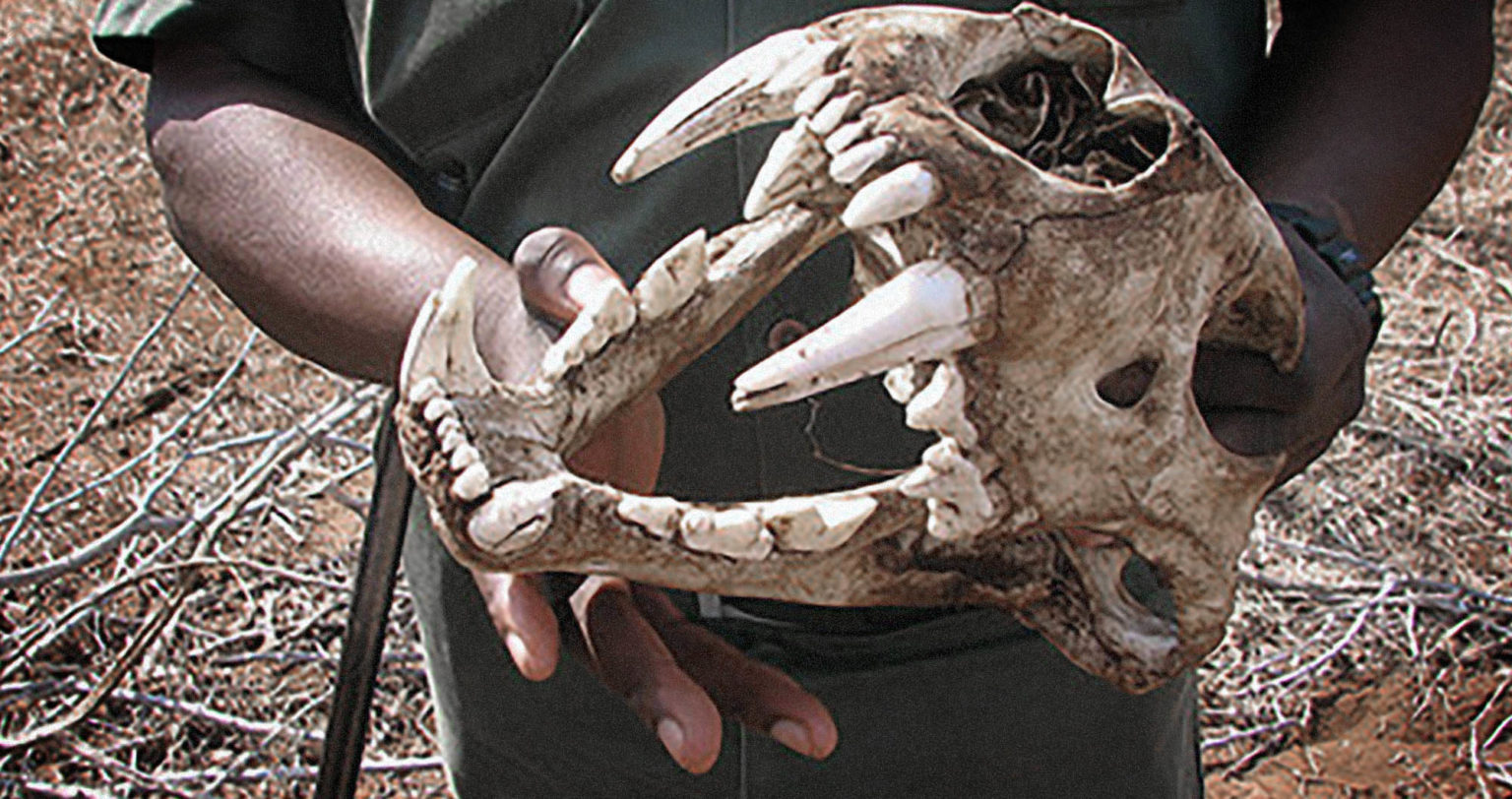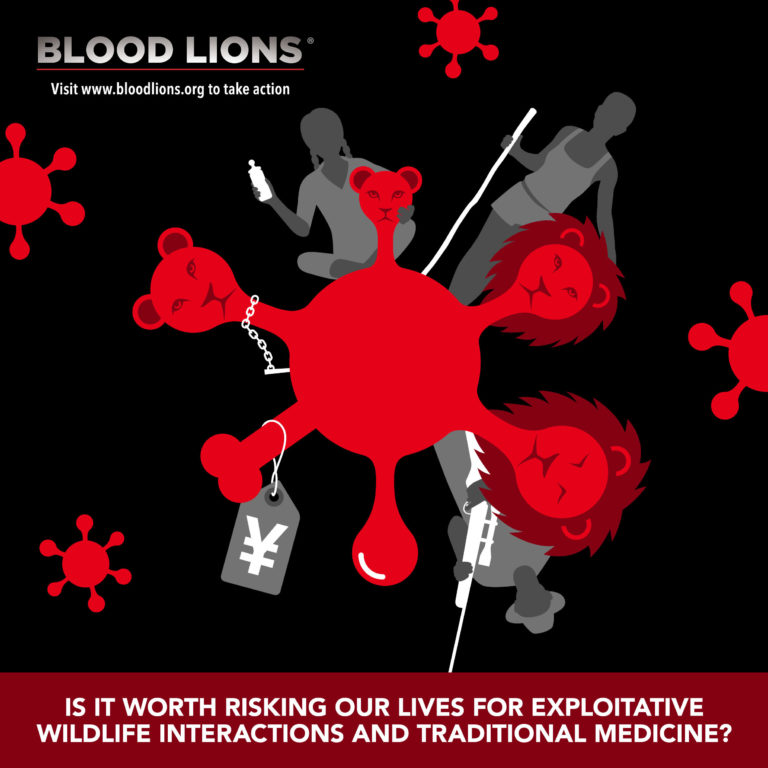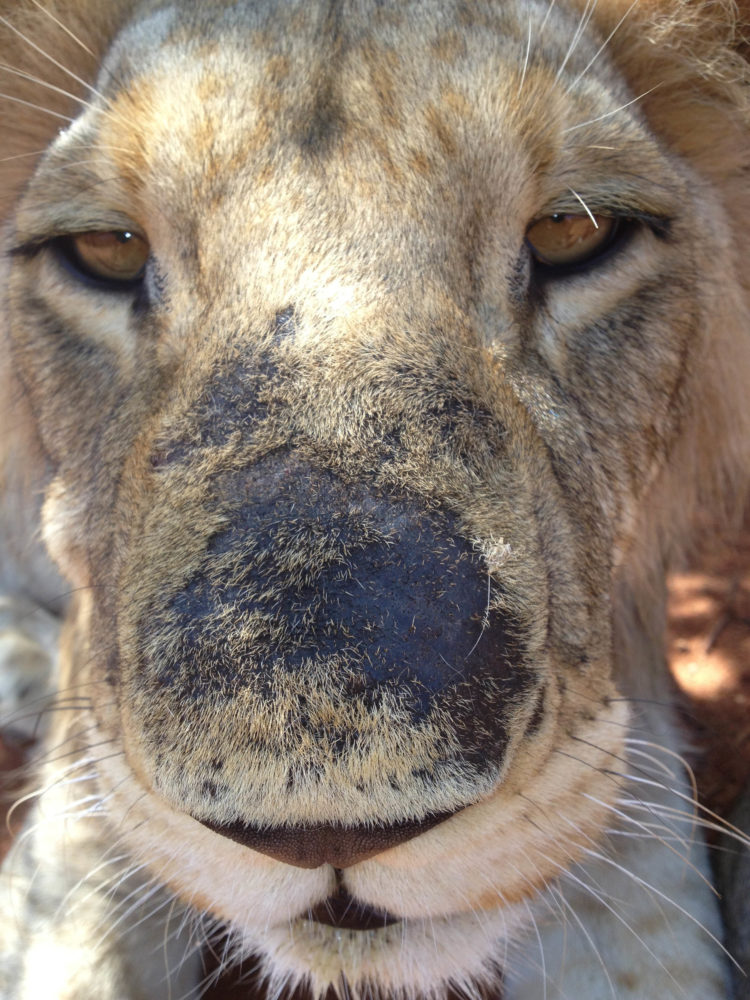Captive Lions /Canned Hunting in SA
- Richprins
- Committee Member
- Posts: 75964
- Joined: Sat May 19, 2012 3:52 pm
- Location: NELSPRUIT
- Contact:
Re: Killing Me Softly: Captive Lions in SA/Canned Hunting
Nope. Not until the author puts up a photo of a cow carcass next to every lion one.
Please check Needs Attention pre-booking: https://africawild-forum.com/viewtopic.php?f=322&t=596
- Lisbeth
- Site Admin
- Posts: 67388
- Joined: Sat May 19, 2012 12:31 pm
- Country: Switzerland
- Location: Lugano
- Contact:
Re: Killing Me Softly: Captive Lions in SA/Canned Hunting
Do you evaluate a cow the same as a lion? 
"Education is the most powerful weapon which you can use to change the world." Nelson Mandela
The desire for equality must never exceed the demands of knowledge
The desire for equality must never exceed the demands of knowledge
- Richprins
- Committee Member
- Posts: 75964
- Joined: Sat May 19, 2012 3:52 pm
- Location: NELSPRUIT
- Contact:
Re: Killing Me Softly: Captive Lions in SA/Canned Hunting
Ask the cow... 

Please check Needs Attention pre-booking: https://africawild-forum.com/viewtopic.php?f=322&t=596
- Lisbeth
- Site Admin
- Posts: 67388
- Joined: Sat May 19, 2012 12:31 pm
- Country: Switzerland
- Location: Lugano
- Contact:
Re: Killing Me Softly: Captive Lions in SA/Canned Hunting
It does not have brain enough to understand the question 
"Education is the most powerful weapon which you can use to change the world." Nelson Mandela
The desire for equality must never exceed the demands of knowledge
The desire for equality must never exceed the demands of knowledge
-
Klipspringer
- Global Moderator
- Posts: 5862
- Joined: Sat Sep 14, 2013 12:34 pm
- Country: Germany
- Contact:
Re: Killing Me Softly: Captive Lions in SA/Canned Hunting
https://www.environment.gov.za/mediarel ... Wrongdoing
SA Government notes content of book alleging wrongdoing in the Lion Management Sector
06 July 2020
The Department of Environment, Forestry and Fisheries has noted allegations made in a recently-published book entitled Unfair Game by Lord Ashcroft about South Africa’s lion breeding and hunting industries.
Environmental management is a concurrent function between provincial and national government. National government is the management authority, while provincial government is responsible for issuing permits which include the registering of lion breeding facilities and issuing hunting permits. The Department of Environment, Forestry and Fisheries is therefore, together with the other provincial environmental departments, the custodian of South Africa’s natural resources, ecosystems and species.
South Africa remains committed to the highest level of compliance with its international obligations. The country continues to act in accordance with, and in fulfilment of, the legal and scientific requirements of the Convention on the International Trade in Endangered Species of Wild Fauna and Flora (CITES).
Importantly, an amendment to the National Environmental Management: Biodiversity Act, 2004 (Act No. 10 of 2004) (NEMBA) has been proposed, as part of the National Environmental Management Laws Amendments Bill, 2017, by the inclusion of an enabling provision for the regulation of the 'well-being’ of faunal biological resources.
The Minister of Environment, Forestry and Fisheries, Ms Barbara Creecy, on 10 October 2019, also appointed an Advisory Committee that will act as a High-Level Panel to review existing policies, legislation and practices relating to aspects such as the handling, management, breeding, hunting and trade of, among other animals, lion.
The Panel will probe, among other things, the breeding of lions in captivity, the hunting of lion, and the trade in lion bones and skins.
The Panel began its work on 19 November 2019. The appointment of the panel followed concerns raised in the public domain about issues pertaining to captive breeding, handling, hunting and trade in lions, elephants, leopard and rhinoceros specimens with implications for the country’s conservation reputation. Equally significant is the need to enhance the contribution of conservation and sustainable use of biological resources to the socio-economic development of the country.
The Minister has written to Lord Ashcroft to invite him to submit his book and any other evidence to the panel for consideration. It will then be possible to review whether remedial action is necessary to strengthen the administrative and regulatory system.
SA Government notes content of book alleging wrongdoing in the Lion Management Sector
06 July 2020
The Department of Environment, Forestry and Fisheries has noted allegations made in a recently-published book entitled Unfair Game by Lord Ashcroft about South Africa’s lion breeding and hunting industries.
Environmental management is a concurrent function between provincial and national government. National government is the management authority, while provincial government is responsible for issuing permits which include the registering of lion breeding facilities and issuing hunting permits. The Department of Environment, Forestry and Fisheries is therefore, together with the other provincial environmental departments, the custodian of South Africa’s natural resources, ecosystems and species.
South Africa remains committed to the highest level of compliance with its international obligations. The country continues to act in accordance with, and in fulfilment of, the legal and scientific requirements of the Convention on the International Trade in Endangered Species of Wild Fauna and Flora (CITES).
Importantly, an amendment to the National Environmental Management: Biodiversity Act, 2004 (Act No. 10 of 2004) (NEMBA) has been proposed, as part of the National Environmental Management Laws Amendments Bill, 2017, by the inclusion of an enabling provision for the regulation of the 'well-being’ of faunal biological resources.
The Minister of Environment, Forestry and Fisheries, Ms Barbara Creecy, on 10 October 2019, also appointed an Advisory Committee that will act as a High-Level Panel to review existing policies, legislation and practices relating to aspects such as the handling, management, breeding, hunting and trade of, among other animals, lion.
The Panel will probe, among other things, the breeding of lions in captivity, the hunting of lion, and the trade in lion bones and skins.
The Panel began its work on 19 November 2019. The appointment of the panel followed concerns raised in the public domain about issues pertaining to captive breeding, handling, hunting and trade in lions, elephants, leopard and rhinoceros specimens with implications for the country’s conservation reputation. Equally significant is the need to enhance the contribution of conservation and sustainable use of biological resources to the socio-economic development of the country.
The Minister has written to Lord Ashcroft to invite him to submit his book and any other evidence to the panel for consideration. It will then be possible to review whether remedial action is necessary to strengthen the administrative and regulatory system.
- Richprins
- Committee Member
- Posts: 75964
- Joined: Sat May 19, 2012 3:52 pm
- Location: NELSPRUIT
- Contact:
Re: Killing Me Softly: Captive Lions in SA/Canned Hunting
Classic political answer. Too bad for Lord Ashcroft! 
Please check Needs Attention pre-booking: https://africawild-forum.com/viewtopic.php?f=322&t=596
- Lisbeth
- Site Admin
- Posts: 67388
- Joined: Sat May 19, 2012 12:31 pm
- Country: Switzerland
- Location: Lugano
- Contact:
Re: Killing Me Softly: Captive Lions in SA/Canned Hunting
The book is full of photographic proof of the horrors of the captive lion industry. Lord Ashcroft is not the first person criticizing the way the animals are treated, just look back in this topic.
"Education is the most powerful weapon which you can use to change the world." Nelson Mandela
The desire for equality must never exceed the demands of knowledge
The desire for equality must never exceed the demands of knowledge
- Lisbeth
- Site Admin
- Posts: 67388
- Joined: Sat May 19, 2012 12:31 pm
- Country: Switzerland
- Location: Lugano
- Contact:
Re: Killing Me Softly: Captive Lions in SA/Canned Hunting

How government is supporting captive lion breeding
BY CHARAN SAUNDERS - 12TH AUGUST 2020 - GROUNDUP.ORG -
Panel overseeing hunting is loaded with industry representatives.
A Parliamentary colloquium passed a resolution in August 2018 to implement legislation with a view to ending captive lion breeding. Photo: Brent Meersman
Ignoring a Parliamentary resolution to introduce legislation with a view to shutting down the captive lion industry, the Minister of Environment, Forestry and Fisheries Barbara Creecy has instead appointed a High-Level Panel with terms of reference intended to side-step the resolution and produce a predetermined outcome.
A Parliamentary colloquium passed by “overwhelming consensus” a resolution in August 2018 to implement legislation with a view to ending captive lion breeding. This was subsequently adopted by the National Assembly “as a matter of urgency initiate a policy and legislative review of Captive Breeding of Lions for Hunting and Lion bone trade with a view to putting an end to this practice”.
In a case of asking the same question again but in the hope of getting a more convenient answer, the Minister has now appointed a high level panel tasked to evaluate the management, breeding, hunting, trade and keeping in captivity of elephants, rhinos, lions and leopards. Surprisingly, there is only one elephant and two lion experts serving on the panel, and not a single rhino or leopard expert.
Similarly with respect to trade, and despite recent allegations of the illegal trade of thousands of animals in the Breaking Point Report, not a single illegal wildlife trade expert, no representative from any monitoring groups such as TRAFFIC, no one from SARS, no member of the Hawks and no epidemiologists or zoonotic disease experts, are included.
Conversely, the panel is loaded with high-ranking members from The South African Predator Association (SAPA), The Professional Hunters Association of South Africa (PHASA ), Custodians of Professional Hunting and Conservation of South Africa (CPHCSA) and the South African Hunters & Game Conservation Association.
Members advocating the non-consumptive use of wildlife were outnumbered 24 to one, until the sole animal welfare protagonist resigned.
Efforts to replace this member have been unsuccessful with prospective replacements refusing to window-dress the panel by accepting nomination.
The WWF-SA has accepted a late invitation onto the panel, but probably not to champion animal welfare. WWF-SA are still committed to the practice of trophy hunting.
Canned lion hunting is illegal in South Africa so SAPA, a private sector body representing 60 of the around 300 captive lion breeders, has developed its own “norms and standards”. These terms seek to sanitise the industry by attempting to distinguish canned hunting from captive lion hunting by creating categories of captive-bred lion.
But conservationists, and many hunters too, believe that hunting a captive-bred lion can never be anything other than a canned hunt.
The world’s leading hunting organisations agree. The Safari Club International (SCI) and Dallas Safari Club (DSC) have shunned the breeding and hunting of all captive lions. The International Council for Game and Wildlife Conservation (CIC) have expelled PHASA for promoting this practice. With SAPA and PHASA so clearly aligned, who is going to hold the panel to international hunting standards?
While opposition to captive lion breeding is growing, with ten international campaigns, high-profile exposés, 18 petitions signed by 1.8 million people, and 42 airlines refusing to transport lion trophies, the Minister appears to be moving South Africa in the opposite direction.
Also well represented on the High-Level Panel, are the wildlife ranchers, with members from the Wildlife Ranching Association, Wildlife Ranches of South Africa, Wildlife Eco-tourism and Bio-Prospecting Association of South Africa, Empower Wildlife Ranching and the South African Agricultural Industry Association.
Since the Departmet of Agriculture unilaterally amended the Animal Improvement Act to reclassify 33 wild animals as livestock and is seeking to add 98 wild animals to the Meat Safety Act, it is clear that the ranching industry is trying to sequestrate wild animals from the purview of DEFF and NEMBA (National Environmental Biodiversity Management Act). This would allow for the breeding of wild animals for meat consumption and the breeding of scarce, higher value species and colour variants for hunting, with no conservation value. Not a single mention of community needs or upliftment in its Terms of Reference
Why would the minister appoint a biased and financially vested panel, who are in direct opposition to a report commissioned by DEFF’s own scientific authority, to decide on matters of biodiversity and conservation?
The report found that intensive management and breeding poses risks to wild populations, including genetic, health, social, welfare and wider ecological risks. It concluded that: “Intensive management and selective breeding of game poses a number of risks to biodiversity at landscape, ecosystem, and species levels, as well as to other sectors of the biodiversity economy of South Africa, and may compromise the current and future contribution of the wildlife industry to biodiversity conservation”.
The South African Hunters and Game Conservation Association opposes the “artificial and unnatural manipulation of wildlife to enhance or alter species … and the intentional breeding of indigenous wild animals in intensive or highly altered semi-intensive production systems for purely commercial purposes”.
PHASA are also against the deliberate breeding of hybrids, but being neither independent nor objective, will they stick to their principles or will they roll over in exchange for securing their own interests?
All of these industries run against each other in fundamental ways. The tourism industry wants visitors to experience the culture and wildlife of South Africa. The hunting industry agrees, but wants to offer the option for hunters to indulge their blood lust. The breeders will produce animals with specific characteristics for hunters. The agricultural industry will domesticate, farm, inoculate and medicate wild animals for human consumption without concern for their welfare.
With not a single mention of community needs or upliftment in its Terms of Reference, it is even clearer who this panel is intended to serve. The High-Level Panel is not creating an all-inclusive wildlife economy, it is giving a free hand to those with a vested financial interest to take even more.
Charan Saunders is a Chartered Accountant and Conservationist advocating sustainable solutions.
Views expressed are not necessarily those of GroundUp.
Original article: https://www.groundup.org.za/article/hig ... -breeding/
"Education is the most powerful weapon which you can use to change the world." Nelson Mandela
The desire for equality must never exceed the demands of knowledge
The desire for equality must never exceed the demands of knowledge
- Richprins
- Committee Member
- Posts: 75964
- Joined: Sat May 19, 2012 3:52 pm
- Location: NELSPRUIT
- Contact:
Re: Killing Me Softly: Captive Lions in SA/Canned Hunting
Safari Club International (SCI) and Dallas Safari Club (DSC) have shunned the breeding and hunting of all captive lions.
In another article today these guys are branded as monsters!
Most hunters are very much against canned hunting, BTW, so one should not automatically lump them all together.
In another article today these guys are branded as monsters!
Most hunters are very much against canned hunting, BTW, so one should not automatically lump them all together.
Please check Needs Attention pre-booking: https://africawild-forum.com/viewtopic.php?f=322&t=596
- Lisbeth
- Site Admin
- Posts: 67388
- Joined: Sat May 19, 2012 12:31 pm
- Country: Switzerland
- Location: Lugano
- Contact:
Re: Killing Me Softly: Captive Lions in SA/Canned Hunting
Zoonotic disease: Study warns about cuddling, keeping and slaughtering farmed lions
By Louise de Waal• 30 September 2020

Bones from a blood lion. (Photo: supplied)
Wild lions can kill you, but farmed lions pose a far greater threat in terms of more than 80 zoonotic diseases that could be passed on to humans.
A joint scientific study by Blood Lions and World Animal Protection has identified 63 pathogens (including bacteria, parasites and viruses) that affect both wild and captive lions. Some of these can be passed from lions to other animals and humans.
The study listed 83 diseases and clinical symptoms associated with these pathogens, highlighting the potential harm they can cause to the health of both animals and people. It warns that this poses a potential health risk to thousands of local and international tourists as well as farm workers and their families.
In South Africa, more than 8,000 lions are bred and kept on commercial farms for tourism, hunting and the bone trade.
The researchers reviewed almost 150 scientific studies on lion-linked diseases. “Wildlife farms can be a hotbed for these diseases,” according to the study, “especially when poor hygiene, poor diet and other stresses associated with captivity weaken wild animals’ immune systems. These can spread rapidly when large numbers – and sometimes even different species – of wild animals are kept in the same enclosures, as this increases the risk of transmission.”

Zoonotic diseases, such as Covid-19, can jump from animals to humans when people come in close contact with wildlife. Many lion farms promote direct contact with the animals for tourism activities. People pay to pet and hand-rear cubs and walk with sub-adults as well as recreational hunting for “trophies”. Farmed lions are also slaughtered so their bones can be exported to Southeast Asia for use in traditional medicine products. This requires many industry workers handling lions during skinning and defleshing in preparation for skeleton export.
The report says captive lions can carry a range of harmful pathogens, including Sars-CoV-2, the virus that causes Covid-19. Despite the large number of lions bred in captivity and the long list of diseases found to affect them, the researchers found no scientific studies investigating health and diseases on commercial lion farms in South Africa. “Without this vital information,” says the study, “it’s impossible to effectively prevent, monitor or manage potential health risks on these farms.”

(Photo: supplied)
According to Blood Lions director Pippa Hankinson, “the research identified substantial gaps in our knowledge base concerning the captive lion breeding industry, which can have huge health implications for farm workers and tourists. With the High-Level Panel expected to make recommendations to the Minister of Environment, Forestry and Fisheries around the management, breeding, hunting, trade and handling of, among others, lions before the end of the year, we hope that they will take note of these important findings.”
As the world struggles to respond to a global health pandemic, there is increasing awareness worldwide about the public health risks from contact with wild animals and to reduce risks wherever possible.
“With tourism slowly beginning to reopen,” says Hankinson, “we have the opportunity to do better, to be better and to create a greener and kinder tourism without wildlife exploitation. The kind of tourism that keeps it wild.”
Blood Lions and Humane Society International are circulating a letter to the SA government demanding the end of captive predator breeding and it’s spin-off industries, and a video on the issue. DM
This article was first published on the Conservation Action Trust website.
Louise de Waal has a PhD in environmental management and founded a sustainable tour operator business, thereafter continuing as a freelance sustainable tourism consultant. She was instrumental in the establishment of the Lion Coalition “to stop the captive breeding and keeping of lions and other big cats for commercial purposes in South Africa” and sits on its Steering Committee. She is currently Blood Lions’ Campaign Manager.
By Louise de Waal• 30 September 2020

Bones from a blood lion. (Photo: supplied)
Wild lions can kill you, but farmed lions pose a far greater threat in terms of more than 80 zoonotic diseases that could be passed on to humans.
A joint scientific study by Blood Lions and World Animal Protection has identified 63 pathogens (including bacteria, parasites and viruses) that affect both wild and captive lions. Some of these can be passed from lions to other animals and humans.
The study listed 83 diseases and clinical symptoms associated with these pathogens, highlighting the potential harm they can cause to the health of both animals and people. It warns that this poses a potential health risk to thousands of local and international tourists as well as farm workers and their families.
In South Africa, more than 8,000 lions are bred and kept on commercial farms for tourism, hunting and the bone trade.
The researchers reviewed almost 150 scientific studies on lion-linked diseases. “Wildlife farms can be a hotbed for these diseases,” according to the study, “especially when poor hygiene, poor diet and other stresses associated with captivity weaken wild animals’ immune systems. These can spread rapidly when large numbers – and sometimes even different species – of wild animals are kept in the same enclosures, as this increases the risk of transmission.”

Zoonotic diseases, such as Covid-19, can jump from animals to humans when people come in close contact with wildlife. Many lion farms promote direct contact with the animals for tourism activities. People pay to pet and hand-rear cubs and walk with sub-adults as well as recreational hunting for “trophies”. Farmed lions are also slaughtered so their bones can be exported to Southeast Asia for use in traditional medicine products. This requires many industry workers handling lions during skinning and defleshing in preparation for skeleton export.
The report says captive lions can carry a range of harmful pathogens, including Sars-CoV-2, the virus that causes Covid-19. Despite the large number of lions bred in captivity and the long list of diseases found to affect them, the researchers found no scientific studies investigating health and diseases on commercial lion farms in South Africa. “Without this vital information,” says the study, “it’s impossible to effectively prevent, monitor or manage potential health risks on these farms.”

(Photo: supplied)
According to Blood Lions director Pippa Hankinson, “the research identified substantial gaps in our knowledge base concerning the captive lion breeding industry, which can have huge health implications for farm workers and tourists. With the High-Level Panel expected to make recommendations to the Minister of Environment, Forestry and Fisheries around the management, breeding, hunting, trade and handling of, among others, lions before the end of the year, we hope that they will take note of these important findings.”
As the world struggles to respond to a global health pandemic, there is increasing awareness worldwide about the public health risks from contact with wild animals and to reduce risks wherever possible.
“With tourism slowly beginning to reopen,” says Hankinson, “we have the opportunity to do better, to be better and to create a greener and kinder tourism without wildlife exploitation. The kind of tourism that keeps it wild.”
Blood Lions and Humane Society International are circulating a letter to the SA government demanding the end of captive predator breeding and it’s spin-off industries, and a video on the issue. DM
This article was first published on the Conservation Action Trust website.
Louise de Waal has a PhD in environmental management and founded a sustainable tour operator business, thereafter continuing as a freelance sustainable tourism consultant. She was instrumental in the establishment of the Lion Coalition “to stop the captive breeding and keeping of lions and other big cats for commercial purposes in South Africa” and sits on its Steering Committee. She is currently Blood Lions’ Campaign Manager.
"Education is the most powerful weapon which you can use to change the world." Nelson Mandela
The desire for equality must never exceed the demands of knowledge
The desire for equality must never exceed the demands of knowledge


